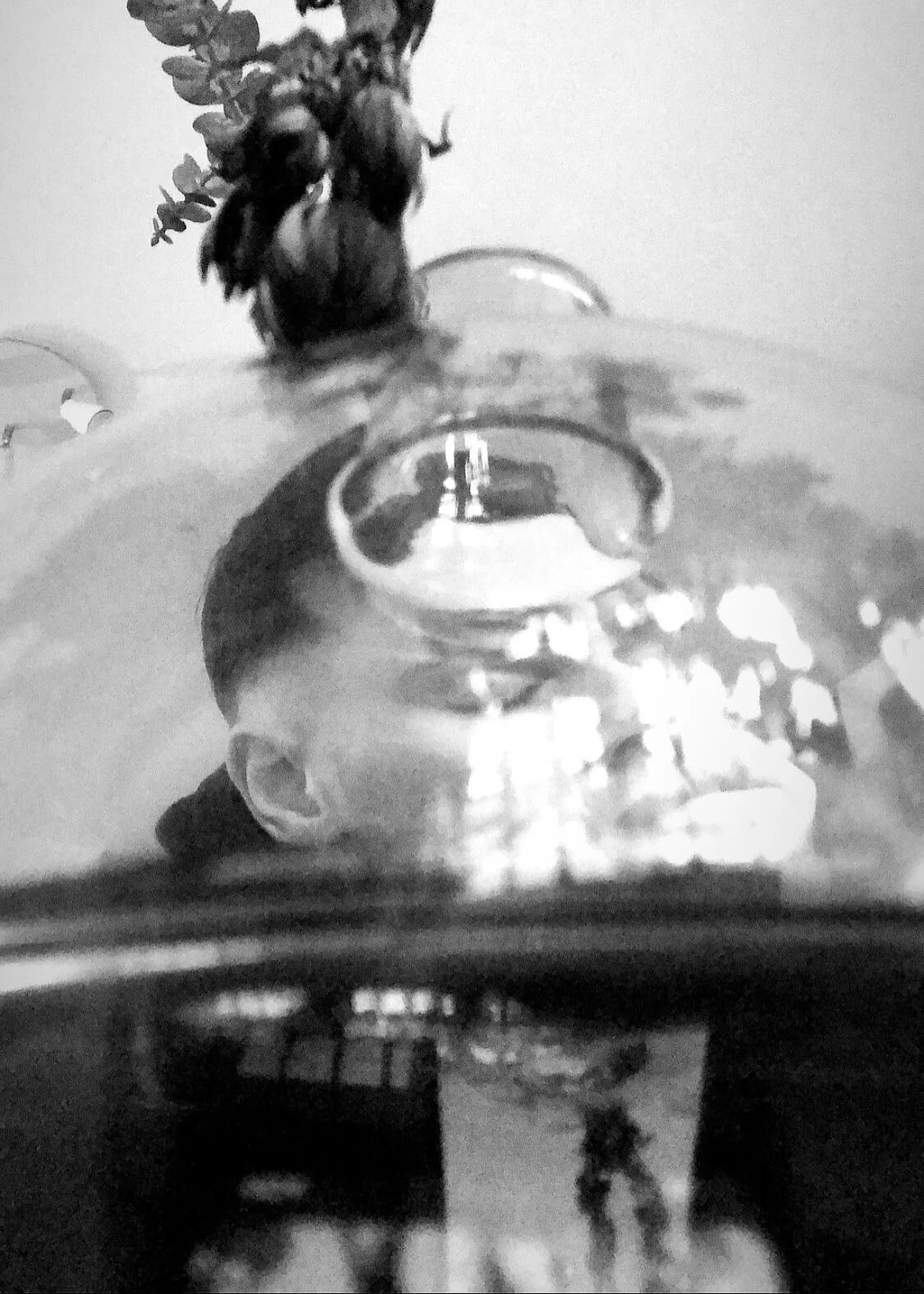Jacob Allen of Puma Blue on his Pivotal Moment of Healing
Written by Serena Ferrari
Photographed by Jacob Allen
Jacob Allen, also known as Puma Blue, tells me over Zoom that he wears his heart on his sleeve. "I've always been someone who would cry at anything, like an advert on TV— I'm just a very teary Pisces type," he jokes. And his music can be equally as lachrymose. Affectionately dubbed "voicemail ballads" due to their lo-fi and intimate nature, Puma Blue reached cult-like acclaim with his nocturnal, soul-bearing tunes. "I think in the past, music was almost my way of crying out. At the least, it would just be like moaning, and at its strongest, it would be pouring out whatever I needed to express into music and just grieving a bit."
I first heard Puma Blue's music on Soundcloud. It was late 2016 when I stumbled on "Want Me," which later became his debut single. It was a jazz-tinged, melancholic lullaby about unrequited love, hypnotically soothing and deeply dejected. It’s a subject matter that can be hard to explore when “you are younger because you have less experience, and so every time [unrequited love] happens, it feels like rejection.” When listening to the track, it's hard not to feel the aches of rejection, but there is solace in hearing those aches in Puma Blue's crooning voice. After "Want Me"' was eventually released on Spotify in May 2017, the prolific twenty-five-year-old musician put out two EPs and a live album that has since amassed the artist over 50 million streams worldwide. He's played jam-packed shows in North America, Europe, and Asia, and now, with much anticipation, is set to release his debut album, In Praise of Shadows, on February 5th (Blue Flower).
Releasing a debut album having already accrued such a following is a little unusual. "It doesn't feel like I'm coming out of nowhere with a swing," Jacob admits. "This feels like a follow-up, so it was actually hard to disregard what fans might want and just try and focus on writing music from the heart, rather than from the need to fulfill expectations." But, In Praise of Shadows satisfies both. The fourteen tracks on the album are a clear progression of the seductive, DIY sound Puma Blue has been cultivating over the years, and while the songs are still tackling themes such as love and loss, a new element has been added to the mix: hope. "I think what I hear a lot in my old stuff is depression. It's just sad with no end in sight, which is very different to how I feel about these songs."
Aware that people were associating his music with a feeling of melancholy, Jacob set out to create an album that was more tender and gentle than his previous work. "Everything I wrote for this album was either coming from a joyful, positive place, or if it were something darker, it was more from a place of understanding, rather than a place of misery." Even the album's emotional tunes are supposed to evoke a more resonant and harmonious sadness, "like when you let yourself cry." However, conducting joy and sadness in equal measure became less of a conscious maneuver and more of a reflection of where Jacob is mentally in his life. "One of the big things that inspired this record was how much of a learning curve the last few years have been," Jacob confides. An ending of a relationship marked an opportunity for the musician to reflect on himself and “about how I wanted to move forward, and with that has come such a release from insomnia, depression, and a negative attitude."
As conveyed by the title, In Praise of Shadows pays homage to the experiences that have corralled Jacob away from despair and towards a place of acceptance. One song on the album, titled "Velvet Leaves", is Puma Blue at his most vulnerable. It's a luscious, trip-hop influenced track where the singer softly recounts the details of a day in 2015 when he almost lost his younger sister to depression. The single was released in September 2020 alongside a music video with grainy home footage featuring Jacob and his little sister as toddlers. The duet of the visuals and lyrics make for a nostalgic mix, “...about how we came together as a family, the veil between death and life, and the toxic masculinity that had a hold of me when I couldn't or wouldn't express myself at the time," Jacob remarked.
“I think in the past, music was almost my way of crying out. At the least, it would just be like moaning, and at its strongest, it would be pouring out whatever I needed to express...”
I was most curious about the "toxic masculinity," and when I asked him about it, Jacob describes going "into flight or fight mode" upon hearing about his sister. "I felt incredibly vulnerable then," he confesses, "but as soon as I got home, I think I chose to sweep everything I was feeling under the rug and be the tough brother who was like, 'don't worry, everything is fine.'“
It's an involuntary and understandable reaction to the ambush of tragedy, especially if one feels emotionally responsible for those around them. But once that bottle has been capped, it can be startlingly difficult to pry open. The artist describes the following nine months as a period where he struggled to access any kind of emotion. “My girlfriend at the time noticed and was just like, ‘where have you gone? I feel like you are not here anymore.’" When asked about the performance of vulnerability and how sometimes we can appear vulnerable without actually being, Jacob is caught off guard. "It's funny," he begins, "now that you mention it, you heard my first song come out in 2016, and I could have written all about that deep, horrible shit, but instead, I was writing about a girl who wasn't into me... Although I probably felt I was being vulnerable, I definitely wasn't accessing 99 percent of what was under there."
It's a pivotal moment in the process of healing, that moment when one stops treating trauma as something that has happened to them and starts embracing it as part of who they are and their story. Because it is precisely those experiences that shape us into the learned humans we become. "Either way, you can't afford not to learn from it,” Jacob reflects. “You just have to make sure that you move on and come away a better person." And Jacob assures me that he is still learning. It's an ongoing process of introspection, a cycle of trial and healing where lessons are learned and sometimes learned again. "I'm looking forward to getting older," Jacob admits. Not only to be able to navigate experiences in a much healthier manner, but also to grow with his craft. He is wary of hitting the ceiling of his career too early on, claiming to be a continuous "student of music." Being such an avid fan and music-lover, Jacob can find it difficult to accept praise. "Whenever fans send me nice messages, I'm often not super receptive to it because I judge my music against all the other great music out there." But it is exactly this humble attitude that motivates him to keep growing as an artist.
For obvious reasons, In Praise of Shadows' release will be different without the ability to tour, and though Jacob longs for the return of live shows— "it's a bit like living life with one hand tied around my back"— the live session will feature an eight-piece band at Battersea Arts Center. "We recorded this live show yesterday, and the band brought such new life to the music. All the new songs felt so fresh to me." Although the show lacked a live audience, being able to “bounce that vibration around the room with other people'' was one of Jacob's highlights so far. Plus, there is a poetic symmetry between the venue and Puma Blue's debut. Formerly Battersea hall, the Arts Center caught fire in 2015, and though subsequently restored, the original structure remains despite the apparent damage. With scars on display, the venue is a visual echo of that pivotal moment of healing: of accepting the darkness in your past and recognizing it as an essential part of your present self— the truest form of vulnerability.
Keep up with Puma Blue.



